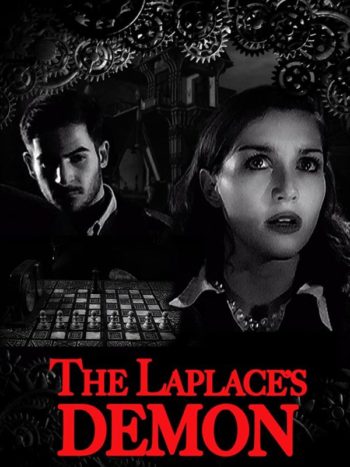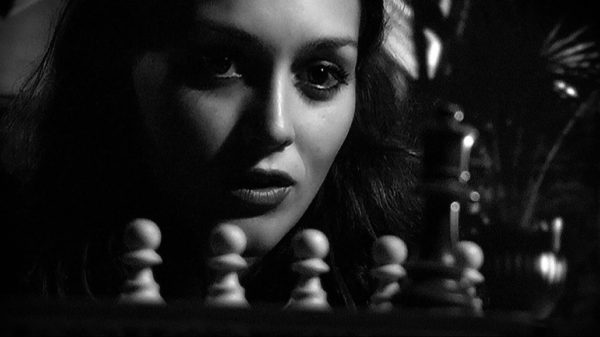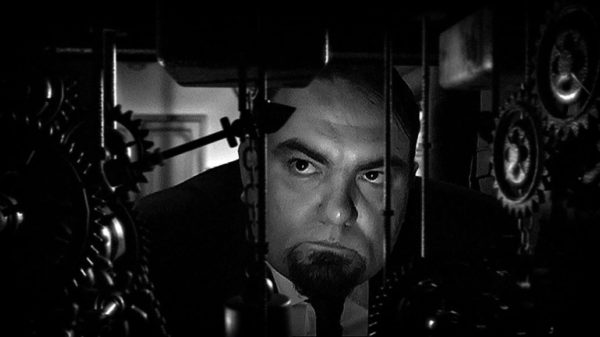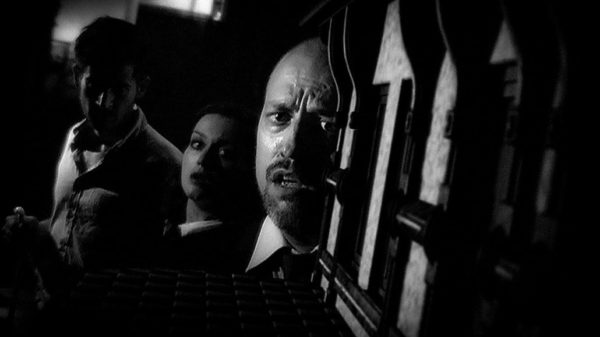The Laplace's Demon (2017)
Directed by: Giordano Giulivi
Written by: Duccio Giulivi, Giordano Giulivi
Starring: Duccio Giulivi, Ferdinando D'Urbano, Silvano Bertolin

THE LAPLACE’S DEMON
Directed by Giordano Giulivi
I’m sure everyone reading this has had an instance when a movie comes along that almost seems as if it were made with them in mind: a cinematic Venn diagram of their biggest interests. I reckon The Laplace’s Demon may be mine, which is why it’s so strange that it’s taken me a year of this being available on VOD to watch it. It’s a horror take on a Christie-style mansion-mystery, almost all taking place in a single location and revolving around scientific determinism: the notion that everything, from the weather to our thoughts, comes down to an elaborate chain of cause and effect. Taking its name from a mathematical monster, that uses classical mechanics to predict the momentum of every atom in the universe, it’s all about the complexity of cause and effect.
If this sounds tough going, don’t worry – you’re eased into it. Some mathematicians have designed a programme to predict how many pieces a glass will smash into – albeit with error. Based on this impressive, if slightly pointless, endeavour they’re invited to visit the enigmatic Professor Cornelius. The enigmatic boffin has a personal interest in them based on a shared passion for forecasting things. However, he wants to apply his calculations to something far more intricate than how a vessel breaks: human behaviour. Notable in his absence, he demonstrates his abilities via a pre-recorded video message, shortly after locking them in. During which, he seems to be able to converse with his guests in real-time, somehow knowing what each will say. If that weren’t proof enough of his abilities, he’s also built a mock-up of his estate complete with pawns that move by clockwork and correspond to each of them. What’s especially weird is it’s a mechanical model too, with no manipulator, meaning the chess pieces that mimic their every movement all follow a pre-programmed schedule. So far so creepy, if still harmless. However, every time the springs uncoil a new piece comes into play: a black Queen. It corresponds to someone, or something, that picks them off one by one. They only need to make it through the night, but how do you survive when your enemy knows everything you’ll do and when.

It’s a smart conceit – not least because of the inherently meta layer that comes with using an artificial medium such as cinema to explore questions of agency. It is, after all, a universe in which all aspects have been preplanned and the shot composition has been meticulously prepared. Heck, seemingly this took 7.5 years to make, so it wasn’t put together lightly. In that respect, the scientists are not just Cornelius’ pawns, but also Giordano Giulivi’s – who does a great job getting all his pieces where he wants them for his thrilling, and fast-paced plotting. Some of the scare scenes in this, when we’re waiting for whatever the queen represents to come back, are a masterclass in building dread – how to do lots with very little. There are also a few inspired set-pieces. I was particularly impressed by how much tension the director got despite conveying chases via chessmen getting moved around a model. Credit to the writers too – The Laplace’s Demon isn’t like Fermat’s Room, or Final Destination, where it pays lip service to big ideas. Instead, they develop the themes on the move and manage to integrate them well within the action. What’s ironic is that you’ll have no idea what’s going to happen next.

Not that this is an entirely good thing. Given a large part of the plot requires Cornelius to be able to anticipate the team’s behaviour, it’s frustrating how underwritten they are. Determinism posits that our personalities, and the way we make decisions, come from a combo of genes and social learning. But we know neither about this lot. So, for the most part, you won’t have the fun of guessing how they’ll adapt. It’s not that they’re unlikeable per se, and the actors do a reasonable job of amping up the melodrama with their exaggerated performances. Still, they lack the sorts of larger than life profiles you’d associate with this sort of subgenre mashup. Despite having elements of pastiche, this is not Knives Out. Hence we don’t have the joys of getting to know our characters well, nor be too fussed by which one pegs it next. The lack of characterisation also means some of the (very clever) reveals in the last act pass without the impact they could. To an extent, this is inevitable given the source of tension is more concept than corporeal. Still, it meant I was more impressed than invested by what I watched.

Still, it’s really bloody impressive though. Despite how much I usually rave about arcs and character journeys being the most critical parts of a film for me, I didn’t finish it feeling unsatisfied. Giulivi is such a strong visual storyteller that I could overlook these shortcomings. His black and white aesthetic adds much to the gloomy atmosphere, and his penchant for odd angles gives it a dreamy quality. It’s also such an utterly unique package that it’s hard not to love it, even if I was left wanting more drama. The script handles the metaphysics wonderfully and given how rarely I see free will comes up in any meaningful sense, this feels more important. I could easily go on for another 800 words, but I’ll stop here. To the extent that all human behaviour may be the product of a sophisticated algorithm, then we may be no free than the cast in this. Meaning, regardless of what I write, you’ll either watch it or you won’t anyway. It’s not like you’ll have any real say.




Be the first to comment